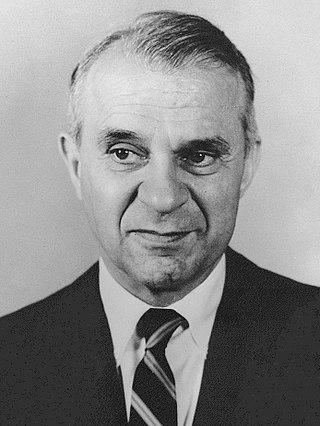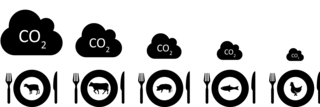
Wassily Wassilyevich Leontief, was a Soviet-American economist known for his research on input–output analysis and how changes in one economic sector may affect other sectors.
Productivity is the efficiency of production of goods or services expressed by some measure. Measurements of productivity are often expressed as a ratio of an aggregate output to a single input or an aggregate input used in a production process, i.e. output per unit of input, typically over a specific period of time. The most common example is the (aggregate) labour productivity measure, one example of which is GDP per worker. There are many different definitions of productivity and the choice among them depends on the purpose of the productivity measurement and data availability. The key source of difference between various productivity measures is also usually related to how the outputs and the inputs are aggregated to obtain such a ratio-type measure of productivity.

Life cycle assessment or LCA is a methodology for assessing environmental impacts associated with all the stages of the life cycle of a commercial product, process, or service. For instance, in the case of a manufactured product, environmental impacts are assessed from raw material extraction and processing (cradle), through the product's manufacture, distribution and use, to the recycling or final disposal of the materials composing it (grave).
In economics, an input–output model is a quantitative economic model that represents the interdependencies between different sectors of a national economy or different regional economies. Wassily Leontief (1906–1999) is credited with developing this type of analysis and earned the Nobel Prize in Economics for his development of this model.
In energy economics and ecological energetics, energy return on investment (EROI), also sometimes called energy returned on energy invested (ERoEI), is the ratio of the amount of usable energy delivered from a particular energy resource to the amount of exergy used to obtain that energy resource.
Emergy is the amount of energy consumed in direct and indirect transformations to make a product or service. Emergy is a measure of quality differences between different forms of energy. Emergy is an expression of all the energy used in the work processes that generate a product or service in units of one type of energy. Emergy is measured in units of emjoules, a unit referring to the available energy consumed in transformations. Emergy accounts for different forms of energy and resources Each form is generated by transformation processes in nature and each has a different ability to support work in natural and in human systems. The recognition of these quality differences is a key concept.
In economics, total-factor productivity (TFP), also called multi-factor productivity, is usually measured as the ratio of aggregate output to aggregate inputs. Under some simplifying assumptions about the production technology, growth in TFP becomes the portion of growth in output not explained by growth in traditionally measured inputs of labour and capital used in production. TFP is calculated by dividing output by the weighted geometric average of labour and capital input, with the standard weighting of 0.7 for labour and 0.3 for capital. Total factor productivity is a measure of productive efficiency in that it measures how much output can be produced from a certain amount of inputs. It accounts for part of the differences in cross-country per-capita income. For relatively small percentage changes, the rate of TFP growth can be estimated by subtracting growth rates of labor and capital inputs from the growth rate of output.
Articles in economics journals are usually classified according to JEL classification codes, which derive from the Journal of Economic Literature. The JEL is published quarterly by the American Economic Association (AEA) and contains survey articles and information on recently published books and dissertations. The AEA maintains EconLit, a searchable data base of citations for articles, books, reviews, dissertations, and working papers classified by JEL codes for the years from 1969. A recent addition to EconLit is indexing of economics journal articles from 1886 to 1968 parallel to the print series Index of Economic Articles.

The carbon footprint serves as an indicator to compare the total amount of greenhouse gases emitted from an activity, product, service, company or country. For a product, its carbon footprint includes the emissions for the entire life cycle from the production along the supply chain to its final consumption. Similarly for an organization, its carbon footprint includes the direct as well as the indirect emissions caused by the organization. Several methodologies and online tools exist to calculate the carbon footprint accurately. In practical terms, the carbon footprint of products could help consumers decide which product to buy if they want to be climate aware. In the context of climate change mitigation activities, the carbon footprint can help distinguish those economic activities with a high footprint from those with a low footprint. In other words, the carbon footprint concept allows everyone to make comparisons between the climate-relevant impacts of individuals, products, companies, countries etc.
Material flow analysis (MFA), also referred to as substance flow analysis (SFA), is an analytical method to quantify flows and stocks of materials or substances in a well-defined system. MFA is an important tool to study the bio-physical aspects of human activity on different spatial and temporal scales. It is considered a core method of industrial ecology or anthropogenic, urban, social and industrial metabolism. MFA is used to study material, substance, or product flows across different industrial sectors or within ecosystems. MFA can also be applied to a single industrial installation, for example, for tracking nutrient flows through a waste water treatment plant. When combined with an assessment of the costs associated with material flows this business-oriented application of MFA is called material flow cost accounting. MFA is an important tool to study the circular economy and to devise material flow management. Since the 1990s, the number of publications related to material flow analysis has grown steadily. Peer-reviewed journals that publish MFA-related work include the Journal of Industrial Ecology, Ecological Economics, Environmental Science and Technology, and Resources, Conservation, and Recycling.
Walter Isard was a prominent American economist, the principal founder of the discipline of regional science, as well as one of the main founders of the discipline of peace studies and Peace economics.
An economic input-output life-cycle assessment, or EIO-LCA involves the use of aggregate sector-level data to quantify the amount of environmental impact that can be directly attributed to each sector of the economy and how much each sector purchases from other sectors in producing its output. Combining such data sets can enable accounting for long chains, which somewhat alleviates the scoping problem of traditional life-cycle assessments. EIO-LCA analysis traces out the various economic transactions, resource requirements and environmental emissions required for producing a particular product or service.
Faye Duchin is an American Computer Scientist and Professor Emeritus of Economics at Rensselaer Polytechnic Institute ("RPI"), where she was the Dean of the School of Humanities and Social Sciences from 1996 to 2002. She worked in the fields of ecological economics and industrial ecology and employs Input-Output Analysis in her work. Her faculty page at RPI stated that she was "concerned with ways of achieving economic development while avoiding environmental disasters."
Jan Oosterhaven is a Dutch economist, who currently is Professor of Spatial Economics at the University of Groningen. Before that, he held positions as associate and assistant professor at the same university since 1970. Between 1985 and 1986, he was a visiting professor at the University of California, Los Angeles, teaching urban economics, and between 1998 and 1999 was as a senior consultant for TNO.
John A. "Skip" Laitner is an American-born economist, author and lecturer. He focuses on developing a more robust technology and behavioral characterization of energy efficiency resources for use in energy and climate economic policy models.
Shunsuke Managi is the Distinguished Professor of Technology and Policy and the Director of the Urban Institute at Kyushu University, Japan.

An energy system is a system primarily designed to supply energy-services to end-users. The intent behind energy systems is to minimise energy losses to a negligible level, as well as to ensure the efficient use of energy. The IPCC Fifth Assessment Report defines an energy system as "all components related to the production, conversion, delivery, and use of energy".
The Industrial Ecology Programme, or IndEcol, in the Department of Energy and Process Engineering at NTNU is an interdisciplinary research programme specialising in sustainable development, circular economy research and environmental issues.

Sangwon Suh is an American industrial ecologist.



